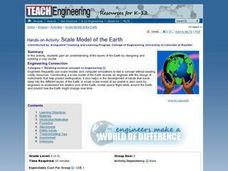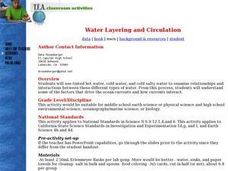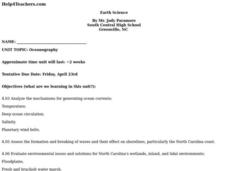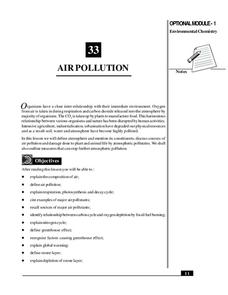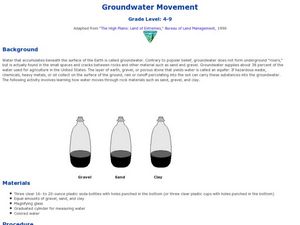Center for Math and Science Education
Volcano Model
When middle school earth science classes are covering volcanoes, they can cut out and construct a miniature model of a stratovolcano and its surrounding town. From the town side, the external features of the volcano appear. On the...
Science Matters
Earthquake Preparedness
Forty-five states and territories in the USA are at moderate to very high risk of earthquakes. The discussion-based lesson covers what to do before, during, and after an earthquake. The 14th lesson in the series includes how to prepare a...
Curated OER
Weathering and Soil Formation
A set of 27 slides systematically shows how weathering, erosion, and deposition contribute to soil formation. Both chemical and mechanical weathering are described, as are resulting soil layers and properties. There is no longer any need...
Curated OER
Types And Magnitudes Of Earthquakes
Students investigate the concept of earthquakes and the different types of magnitudes. They research the Richter scale and how it is used to measure the intensities of earthquakes. Students then apply the concept by completing a...
National Wildlife Federation
Why All The Wiggling on the Way Up?
Some of the CO2 emitted by burning fossil fuels is removed from the atmosphere by natural sinks, such as the ocean. The fifth engaging lesson in the series of 21 examines the CO2 data from three very different locations. It then makes a...
Curated OER
Scale Model of the Earth
Students work together to create a model of the Earth. They label and identify each layer and describing its properties. They discover how engineers use models to test different concepts.
Curated OER
Ozone Layer
Seventh graders develop an understanding of the ozone layer, it's affect on Earth, and the effect of human activity on the ozone layer. They then interpret data from satellite pictures and develop an understanding of longitude/latitude...
Curated OER
Fossil Fuels (III), The Geology of Coal: Interpreting Geologic History
Young scholars hypothesize about why various samples of coal have different characteristics. Pupils use information that they found during Internet searches to ascertain the validity of their hypotheses and verify the "story" of coal. ...
Curated OER
Climate Change: Is there a Controversy
Students explore climate changes. For this climate changes lesson, students research what causes changes. Students search the Internet, summarize reports they find and create a poster with the information.
Curated OER
Water Layering and Circulation
Students examine relationships and interactions between different types of water. They experiment with colored water of different temperature and salinity and discuss how the results relate to real ocean currents.
Curated OER
The Effects Of Earthquakes
Students investigate the concept of how earthquakes occur and the after effects of how they effect landforms. They conduct research it using a variety of resources and measure the varying intensities of how earthquakes effect the...
Curated OER
Earth Science
Young scholars analyze the mechanisms for generating ocean currents, temperature, and deep ocean circulation. They are able to assess the formation and breaking of waves and their effect on shorelines, particularly the North Carolina...
K12 Reader
Rainforest Ecosystems
Rainforests are the topic of this brief reading passage. Learners can find out all about the different layers of the rainforest as well as the types of creatures that live there. After reading, they respond to five questions about the text.
National Institute of Open Schooling
Air Pollution
Seventy percent of the air pollution in China is due to car exhaust. Under the umbrella of environmental chemistry, learners extensively explore air pollution. From the makeup of our atmosphere to sources of major air pollutants, classes...
Curated OER
Tropical Rainforests
Students create their own rainforest environment. This tropical rainforest lesson, introduces where rainforests are located, their real world connections, and their structural make up. It includes further resources online.
Curated OER
Incorporating 3D Visualizations into Your Classroom
Students make observations through 3-D visualizations. They explore scientific and geologic processes through the use of 3-D pictures.
Polar Trec
What Can We Learn from Sediments?
Varve: a deposit of cyclical sediments that help scientists determine historical climates. Individuals analyze the topography of a region and then study varve datasets from the same area. Using this information, they determine the...
National Wildlife Federation
Why All the Wiggling on the Way Up? CO2 in the Atmosphere
The climate change debate, in the political arena, is currently a hot topic! Learners explore carbon dioxide levels in our atmosphere and what this means for the future in the 11th installment of 12. Through an analysis of carbon dioxide...
Wilderness Classroom
Pollution
Educate scholars on pollution—air, water, and land—with a series of lessons that begin with a thorough explanation of each type. Learners then take part in three activities to reinforce the importance of reducing pollution. They...
Curated OER
Air Quality Issues
Students identify the different layers of the atmosphere. They examine the different types of air pollutants. They also discover laws in effect that work to protect the environment.
Curated OER
The Rain Forest of Costa Rica
Fifth graders examine and discuss the topography, climate, natural resources and artwork of Costa Rica. They develop a diagram of the layers of the rain forest, and design a tourist brochure or advertisement promoting Costa Rica's...
Curated OER
Ring of Fire
Students locate some of the 1,500 active volcanoes on a world map. Then by comparing their maps with a map of the world's tectonic plates, they discover that volcanoes occur because of the dynamic nature of the Earth's lithosphere.
Curated OER
Blazing Gas
Fourth graders read and discuss the sun and the energy we use on Earth from the sun. In this sun lesson plan, 4th graders discuss the solar system, planets, and answer short answer questions.
Curated OER
Groundwater Movement
Students study groundwater movement beneath the surface of the Earth. In this agriculture lesson, students experiment with how water moves through rock materials such as sand, gravel, and clay.







